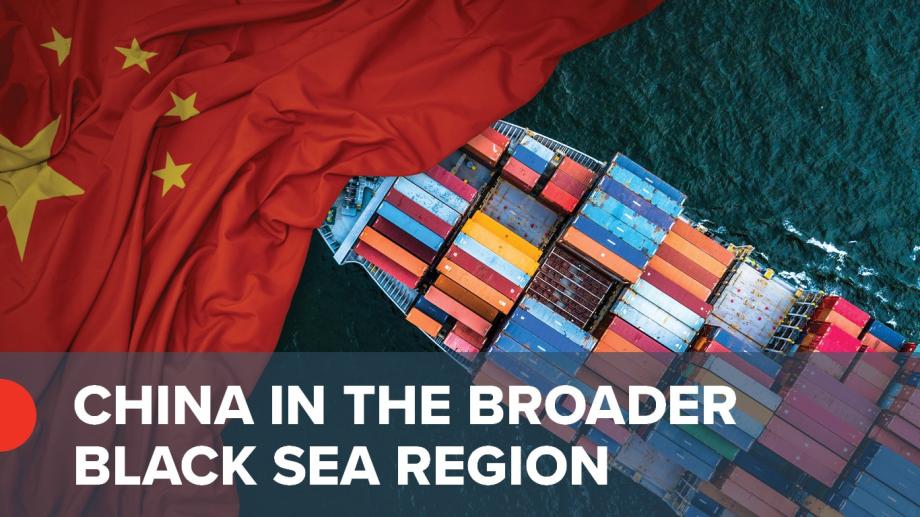China in the Broader Black Sea Region

The world is going through profound geopolitical recalibration, as great power competition is back on the cards, appearing to be the dominating modus operandi on the international stage now. China’s rising power along with its growing geo-political and geo-economic ambitions, continue to raise concerns among the transatlantic community. The Chinese ascend is seen by many as a challenger to the Western-dominated liberal order, which had been left unquestioned till recently. Many observers today look at the global landscape through the lens of an ever-intensifying global confrontation between democracies and authoritarian models of governance. And in this regard, Beijing seems poised to secure a more active role in the international system and determined to be among the rule-setters of this century. Today, China accounts for over 12 per cent of global trade and about 15.5 per cent of the world’s GDP. Since 1978, the country’s average growth rate was 9.5 per cent of GDP and is now the world’s largest producer of manufactured goods.
US-China tensions and trade wars have dominated the global agenda in the last couple of years, to a point where fears about a possible decoupling and a new “Cold War” have become real policy options, rather than just IR simulations. The new U.S. administration is expected to shape a less bellicose narrative vis-à-vis China but, President Biden is likely to continue criticism of President Xi’s policies; and he can be expected to work with allies and partners to counter Beijing’s assertiveness and aggressive rhetoric, especially over economic policies, human rights and security issues.
The EU has been caught in the middle of this power struggle, with its transatlantic identity on the one side and its economic interests on the other. The Union is China’s largest trade partner, while China is the EU’s second-largest trade partner after the US. In 2019, the European Commission published the EU-China Strategic Outlook and outlined the approach the EU would embrace with regards to the developing relationship with China. China was recognized as a negotiating partner, important in the fight against climate change and in the efforts to revive multilateralism. At the same time, the EU characterized China as an economic competitor and a systemic rival. The document also outlined the need for more balanced and reciprocal trade conditions and steps to strengthen Europe’s own economy. By concluding the agreement in principle on an investment after seven years of negotiations- Comprehensive Agreement on Investment (CAI)- the Union’s ambition to achieve a more even economic relationship with China seems to have been satisfied, especially on opening the domestic Chinese market, to sectors like financial services, manufacturing, and real estate. The deal caused waves on both sides of the Atlantic, with supporters applauding the effort pushed across the line by the German Presidency in the interest of Europe in the last days of 2020. However, many critics could not help but emphasize the wrong symbolism of the EU’s strategic autonomy ambitions towards China and the lack of coordination between Brussels and Washington DC on a possible transatlantic consensus on China.
The intricacies of this geopolitical reordering can be observed in the Broader Black Sea region, a space that has become the interplay of power, economic, and ideological interactions between superpowers. China’s policy of engagement in the region, underpinned by the Belt and Road Initiative (BRI) and more specifically the ‘17+1’ platform, has at times received possibly unjustified attention, with the region being considered a ‘trojan horse’ for Chinese influence in Europe. Despite the grand expectations, the BRI has in many ways, failed to live up to its promises of delivering benefits in the region. In Central and Eastern Europe, unfinished BRI projects significantly outnumber the ones which have been completed. Across the region, disillusionment with the economic results of engaging with China, especially through frameworks like the BRI or the 17+1 arrangement, is growing. Concerns about economic asymmetries, economic dependency, and rising trade deficits are now at the forefront of the trade and infrastructure cooperation relationships with China, with few exceptions detailed in this report’s pages.
This work investigates China’s growing presence and influence in the Broader Black Sea Region amid increased great power competition. It focuses on and explores a myriad of issues, including China’s Belt and Road Initiative, instability in Europe’s neighbourhoods, Sino-Russian, and Sino-Turkish relationships. An EU and a transatlantic comprehensive China policy that takes into account the needs and interests of the countries in the region requires a substantial understanding of the challenges and opportunities on the table.
